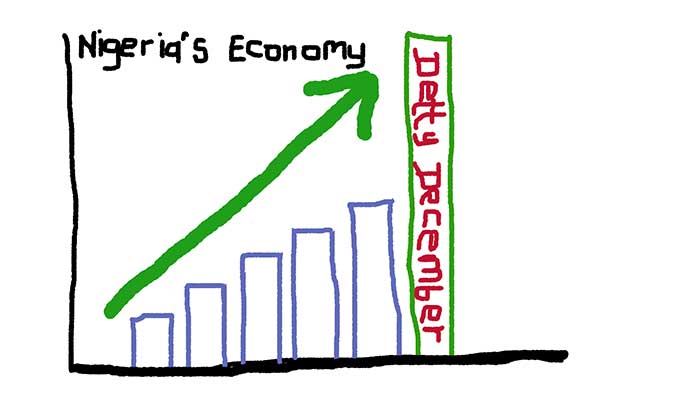Nigeria’s economy pulled off a marginal growth in December, as the nation joins other countries to mark the holiday season. This period, known as Detty December, was one to remember, as the nation’s commercial hub, Lagos, recorded massive inflow of Diaspora inflow.

We all know that so many Nigerians left the country between 2023 and 2024 in what is now termed ‘Japa syndrome‘. They had left for jobs abroad.
Truly, even those who went for studies had this financial liberation and increase at the back of their mind.
Most of the people who left, secured jobs and have now settled in, with most of them able to make remittances to Nigeria.
Leisure And Tourism
What has this done for Nigeria’s economy?
Independent research by advisory firm MO Africa Company Limited shows that between November 19 and December 26, 2024, Lagos’ Murtala Muhammed International Airport (MMIA) handled around 550,000 inbound passengers.
Close to 90% of these individuals who flew into Nigeria were Nigerians living abroad. Most of them came in for leisure and tourism.
Other foreigners also came for entertainment shows.
According to the CEO of MO Africa Company Limited, Kayode Omosebi, the team surveyed hotels, airports, short-let agents, and nightclubs to compile the data.
Top Countries Of Origin
Basically, the report says the top five countries of origin were the United States, Canada, Italy, South Africa, and the United Kingdom.
Most of the visitors that came in settled in Lagos, Edo, Delta, Ondo, and Ogun states.
Furthermore, the report highlights that Lagos alone attracted an estimated 1.2 million tourists, most of which were domestic travellers, driven by insecurity in southeastern Nigeria.
As a result, hotel bookings and short-let apartment rentals surged, with December revenue hitting ₦54 billion ($36 million) from 15,000 bookings.
Other Assistance Inflow For Detty December
Nigeria’s inflation rate had before December hit its highest in 28 years. As of November 2024, the inflation rate in Nigeria was 34.60%, a rise from 33.88% in October 2024.
This has been the trajectory since the beginning of the current administration of President Bola Tinubu.
With prices of goods increasingly going out of the reach of the average salary earner, Nigerians abroad were not ignorant of the situation back home.
A pack of 350 grams of milk a family used to buy for a price below ₦1,500 had moved to ₦3,000 and counting, with the quantity dropped to 320 grams.
Also, a kilogram of chicken they used to buy ₦2,600 had moved to over ₦5,000, making it hard for people to have a Detty December without aid.
Interestingly, people abroad sent in some money to their people here in Nigeria, to cushion the effect of the harsh economic reforms.
Most of them had lists with names of people they would extend love to, with money allocated to those names.
This inflow, yet to be accounted for by relevant agencies in reports, pushed up the nation’s economy further.
The economic situation in Nigeria has now given another impetus to ‘Okrika’ business in Lagos. Many who cannot afford new clothes now patronise this second-hand cloth market.
In the video, you will learn about where the Biggest Okrika market is in Lagos.

